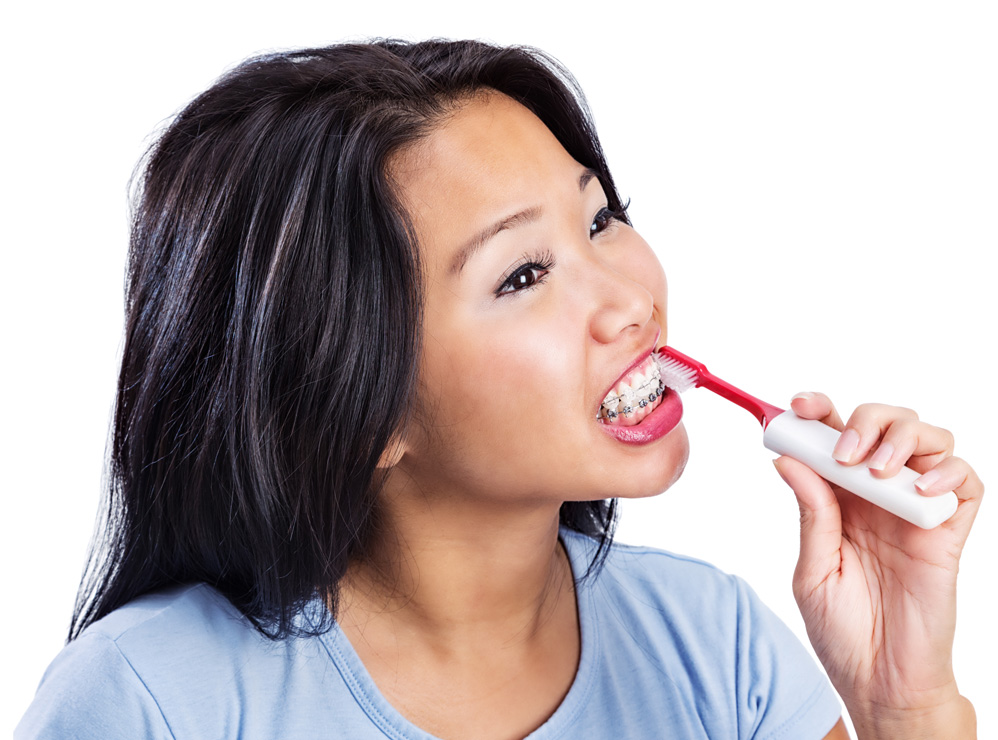Life with braces
Once you get braces it’s important to know how to care for them throughout your entire orthodontic treatment. Bayside Orthodontists understand that life doesn’t come to a standstill when you have braces. These tips and recommendations will help.



Eating with braces
When you have braces it’s important to take special care to avoid food that may damage them. Here are our top tips for what to eat and what not to eat while wearing braces.
Foods to avoid with braces:
- Sticky foods and candy including toffee, caramels, Starburst, licorice, gummies
- Any hard candy
- Super hard foods including whole nuts, crunchy or frozen granola bars, popcorn, hard pizza crusts
- Avoid chewing ice




Foods to be careful with:
- Cut meat off the bone instead of chewing it from the bone
- Cut all corn off the cob rather than chewing it from the cob
- Remove pits from fruits such as apricots, peaches and plums
- Cut up apples, pears, carrots, and other hard fruits and vegetables instead of biting into them
- Break any hard bread rolls or buns into smaller bites
- We advise our patients to take it slow in the beginning by taking smaller bites and chewing gently.
- It’s important to avoid chewing bubble gum and other sugared gums because they cause rapid formation of cavities




4 tips for your brace care
- Avoid consuming sugary and highly acidic drinks. These types of drinks can harm the health of your teeth.
- Clean your braces or aligner after every meal. Keeping your braces or aligner clean reduces the risk of tooth decay.
- Use the toothbrushes and mouthwash we provide. Using mouthwash will help remove any pieces of food that may have become stuck in your braces. The brushes we provide are recommended to help reduce the risk of plaque building up on your teeth.
- Be cautious. If at any time you’re concerned about your braces or teeth, contact us. Bayside Orthodontists are here to help you to ensure your treatment is as comfortable, enjoyable and successful as possible.




What happens if my wire or bracket breaks during treatment?
We define breakage as a situation where an appliance (braces, wires, plates) you’re wearing or some part of it has become loose, dislodged or is not fitting as it used to but isn’t hurting you. For example, you may have eaten something hard and broken off a bracket glued to one of your teeth.
An emergency is when something orthodontic that you are wearing is hurting you. For example a wire is poking out behind a last tooth and is digging into your cheek or a plate that you’re wearing is rubbing up an ulcer on your gum.
If you experience a breakage or emergency, contact us to arrange an appointment.




What to do if you experience soreness from braces or appliances
After you first get your braces, you may notice that your mouth and teeth can feel a bit sore or tender. Feeling this is perfectly normal for patients who have just had their braces put on; this feeling won’t last forever though. To relieve any pain, we also recommend you using over-the-counter pain medication such as paracetamol or ibuprofen to make things more comfortable for you. Most patients only need to do this for a couple of days.
Your lips, cheeks, and tongue may become irritated for one to two weeks as they toughen and become used to the braces. This is a normal part of the treatment process. Using the wax we provided over your braces can reduce this irritation. If you need more wax, call us.




How many appointments will I need after my braces have been applied?
After receiving your braces, you will need to have short check-ups to monitor your progress. These appointments will occur between 8 to 12 weeks apart.
How much will Orthodontic treatment cost?
Orthodontic costs will depend on your treatment and how long you’ll need the braces for. Discreet orthodontic treatment options like ceramic and Invisalign require more investment while traditional braces are more cost-efficient.




What to do if you feel like your teeth are loose
It’s normal for your teeth to begin feeling a little loose or wiggly after your braces have been fitted. Your braces work by first loosening your teeth so they can move into the right position. Your teeth will no longer be loose once they’ve been repositioned.




Book your Invisalign appointment today
Find out more about these invisible teeth straightening treatments.















